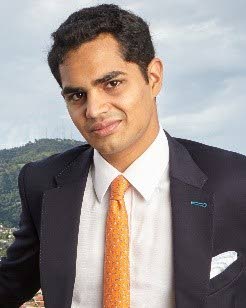Wizards to banish crime

kmmpub@gmail.com
The fear of sudden bullets and blood is alive. It is vivid. Its tendrils reach toddlers and ministers.
But criminals do not manifest overnight. They were children once: and went to school. If we can make school a compelling place, our children might yet retain a sense of wonder, and sense of self; and turn away from crime.
This is ever more urgent. Children today will enter a world in which 47 per cent of today’s jobs will not exist, as a team of prominent Oxford academics has already warned.
Those few children who are prepared for the 21st century are the brightest students with the best parents and most advantages. They will do well regardless of their schooling.
The rest are being left behind. Even children who do well in school today leave just about prepared for the 20th century. Children who do badly leave well prepared for the 19th century. Schools have been largely designed along factory lines during the third industrial revolution. We churn out students like Ford Model Ts.
Most dangerously: our curriculum and tests revolve around rote memorisation and regurgitation of facts – facts that are a Google search away for any ten-year-old.
Complex problem-solving, critical thinking and creativity are the top skills required in 2020 (next year!). according to employers in the World Economic Forum’s Future of Work report.
In an age where a child may be exposed to as much information in one day as a farmer in the Middle Ages may have been exposed to in a lifetime, they are instructed to ignore distractions and pay attention. Children are not being taught how to engage with the vast amounts of information that are available to them.
Educator Sir Ken Robinson cites a classic study on divergent thinking. Researchers tested kindergarteners on their ability to see multiple answers, possibilities and interpretations in a given question (for example: How many uses can you think of for a paper clip?). Ninety-eight per cent scored at genius level.
Five years later they went back and tested the same children. This time only 32 per cent scored at genius level. Ten years later that dropped to ten per cent. Adults only score two per cent.
Sir Ken concludes two points: “One is, we all have this capacity, and two, it mostly deteriorates…by now, they have become educated...they’ve spent ten years in school being told there’s one answer, it’s in the back.”
We ask workers to “collaborate” in the workplace, while the same behaviour in school is punished as “cheating”.
Administrators mean well but are spread thin. Teachers are overburdened and demotivated by the struggle of forcing students to sit and memorise facts. Our best teachers are forced to hew closely to rigid curricula. They are deprived of the freedom to inspire students.
Meanwhile, parents and students alike are made miserable, forced as they are to undergo the pressures of exams designed for another age.
Combined with education’s “assembly-line model.” the net result is to force children onto rigid career paths. And crime is the most rigid path of all.
But for that to be valued within the system, our exams must changed. Instead of memory, exams should test problem-solving, creativity and critical thinking. If exam boards collaborate with the best universities, they can ensure that redesigned exams are taken seriously the world over. And we can empower teachers and give them tools that allow their classes to learn by doing.
Junior Achievement Worldwide president Asheesh Advani describes one programme in which students develop products. They lead, produce and sell, building businesses. The safe environment allows these students how to fail well. Practical experiences help students cast aside the fear of trying new things.
This is doubly true if children work with technology. Medical doctor Robin Hosein told me how he decided to teach his six-year-old daughter simple coding. At seven she enrolled in a sixth-form computing class. Not surprisingly, she is now a senior developer at Google.
Schools in TT do have programmes like these – but they are small and extra-curricular. We must make them integral to education.
Sometimes just one word of encouragement from an instructor, friend or relative is needed for a child to connect with technology, as Sugata Mitra at the University of Newcastle has shown. Once that hurdle is overcome, children’s natural curiosity and imagination always step in.
When I was a child I dreamt of being a wizard. Today, too many children dream of gunshots. If we restore schools, we restore childhood – and save adulthood.
Kiran Mathur Mohammed is a social entrepreneur, economist and businessman. He is a former banker, and a graduate of the University of Edinburgh


Comments
"Wizards to banish crime"